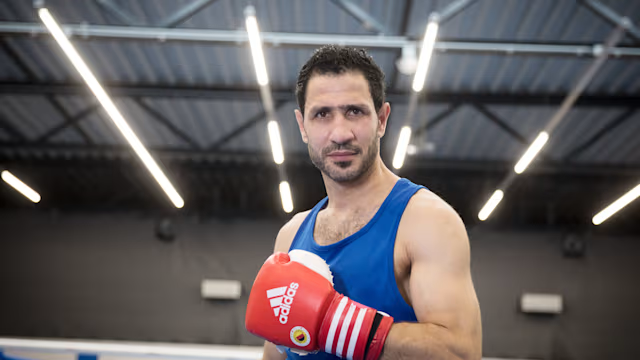Wessam Salamana’s story is one that goes far beyond the boxing ring. Born in Al-Mushrifah, Syria, on October 26, 1985, he rose through the ranks of his country’s boxing scene with determination and discipline. From an early age, boxing offered him more than sport—it became a structure of resilience, discipline, and self-expression in a society where opportunities were often limited. His rise to prominence within Syria’s national boxing team culminated in his bronze medal at the 2010 Asian Games in Guangzhou, a moment that solidified his reputation as one of the nation’s top fighters and placed him on the global boxing map.
Two years later, Salamana achieved what most athletes only dream of: competing in the Olympic Games. Representing Syria at the London 2012 Olympics, he fought in the bantamweight division. While his journey in the competition was cut short after a first-round defeat, the significance of that moment went beyond the result. For Salamana, stepping into the Olympic ring was the culmination of years of dedication, sacrifice, and national pride. It also marked the beginning of a new chapter, one that would be defined not just by sport but by resilience in the face of profound challenges.
As Syria descended into civil war, life changed dramatically for Salamana and his family. In 2015, they made the difficult decision to leave their homeland, joining the millions who fled conflict in search of safety. Resettling in Germany, Salamana faced the daunting reality of starting over. The transition was not easy. Adapting to a new culture, learning a new language, and rebuilding a career while carrying the weight of displacement tested him in every way. Yet, despite these challenges, boxing remained his anchor. It provided stability, focus, and the determination to keep moving forward.
In Germany, Salamana continued to train, refusing to let circumstances dictate the end of his athletic career. His resilience caught the attention of the International Olympic Committee at a crucial time. In 2016, the IOC established the Refugee Olympic Team to give displaced athletes a chance to compete at the Games. For Salamana, this became the bridge that reconnected him with his dream. After years of rebuilding, he qualified to represent the Refugee Olympic Team at the Tokyo 2020 Olympics, this time competing in the lightweight division after his original bantamweight category was removed. Although he again faced an early exit, the symbolism of his presence on that stage was far greater than victory. He was no longer just representing himself—he carried the weight of millions of displaced people, showing that identity, ambition, and perseverance cannot be erased by war or exile.
Salamana’s journey in Germany did not stop with the Olympics. He pushed further, competing in European tournaments and continuing to prove his worth in the ring. In 2023, he achieved a new milestone when he became the German national champion in the featherweight division, a triumph that reflected both his personal determination and his successful integration into a new society. It was a victory that spoke not only to his skills as an athlete but also to his resilience as an individual who had rebuilt a life from the ground up.
Beyond the medals and competitions, Wessam Salamana represents something larger: the ability of sport to transcend borders and the resilience of the human spirit in the face of unimaginable hardship. His story embodies resilience, identity, and hope. For refugees across the world, he is living proof that displacement does not mean the end of ambition. His ability to train, compete, and succeed despite the difficulties of migration highlights the importance of opportunity and support for displaced communities.
What makes Salamana’s journey so inspiring is that his legacy is not limited to personal achievements. He has become a symbol of representation for the refugee community on the world stage. Every time he steps into the ring, he demonstrates that refugees are not defined by their struggles alone, but by their talents, dreams, and contributions to society. His journey challenges stereotypes and redefines how refugee athletes are perceived.
As his career continues, Salamana’s influence will likely extend beyond boxing. He has the potential to inspire future generations of displaced athletes, to mentor young talents navigating similar journeys, and to use his platform as a voice for resilience and empowerment. His story highlights the transformative power of sport—not just as competition but as a universal language that bridges divides, restores dignity, and creates belonging.
Wessam Salamana’s life is one of grit, sacrifice, and triumph. From the streets of Syria to the Olympic stage, from displacement to rebuilding in Germany, his journey reflects the strength of the human spirit against adversity. More than just a boxer, he is a symbol of hope and perseverance, proving to the world that while war may displace people from their homes, it cannot strip them of their dreams.

